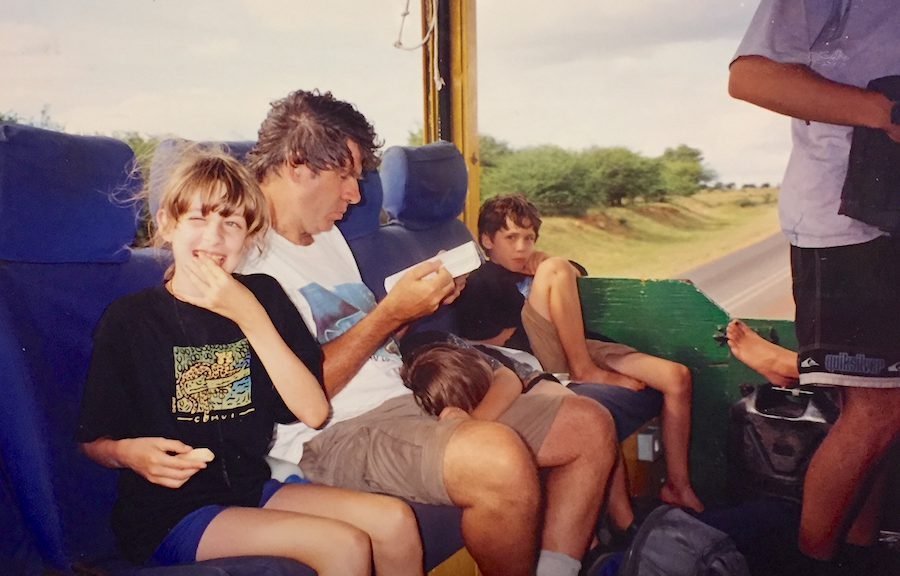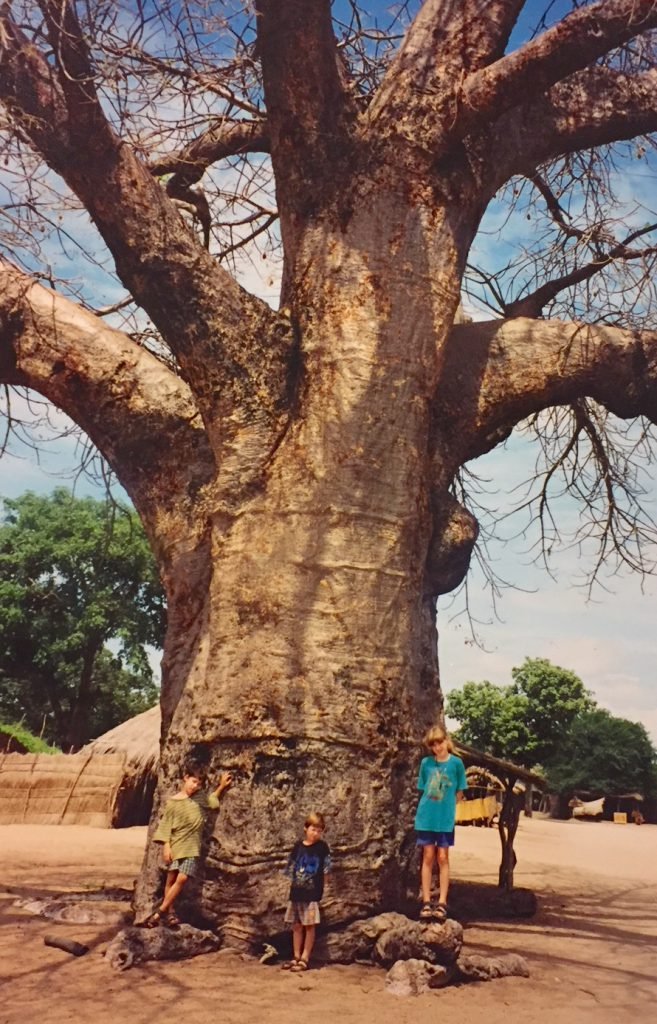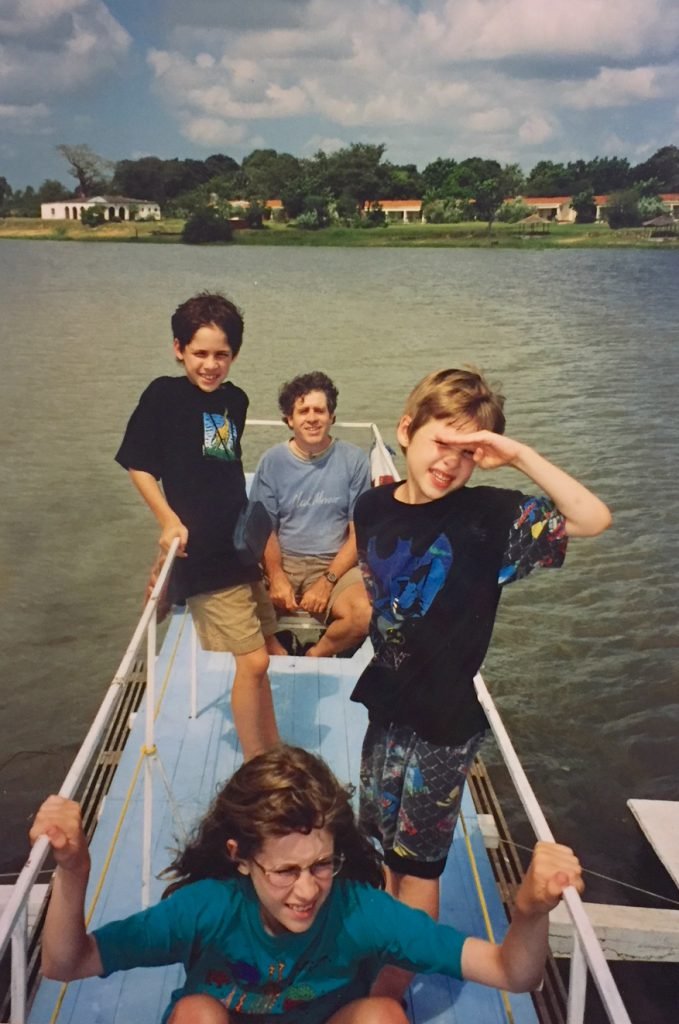
Adventures on the Malawi Trail
Our family’s thrilling four-hour adventure scrambling down a steep path from Malawi’s Mulanje Massif in a violent thunderstorm just whetted our appetite for more exciting experiences. After two months of backpacking in Africa, our children Sam, 6, Danny 9, and Rachel, 10, were still having fun. We returned to Doogles Backpackers Lodge, our home away from home in Blantyre, Malawi, for a few days before heading north on some dreadfully wretched buses and one totally crazy ride on a pickup truck on our way to the stunningly beautiful Lake Malawi.

At times in Malawi, Sam was like a one-man trauma unit. One night he leaped blindly into bed, smashing face first into an iron railing and picking up a nasty shiner. Chasing his brother Danny, a week later at Cape Maclear, Sam plowed into an open window frame, slicing his scalp deep enough for stitches. There were no doctors around, but his mother, Philippa, pressed a large bandage over the cut and stopped the bleeding. She had a well-stocked medical bag, a necessity for a trip like this. Two days later Danny managed to unintentionally kick a pile of dirt into Sam’s eyes. Some travelling medical students helped clean his eyes and we applied a special antibiotic cream from the medical kit and it worked out well. Sam was one tough kid.

Some of the smaller lodges and cabins we rented in Malawi left a lot to be desired – critter wise. We stayed at a place called Golden Sands at Monkey Bay, on the shores of Lake Malawi. That night at 2 a.m. Danny woke up screaming, “There’s a frog inside my mosquito net!” and leaped from his bed in a panic. He had felt something funny on his foot, shook it instinctively and a huge frog jumped directly onto his bare chest. Philippa kept telling him that he must have imagined it, but Danny wasn’t convinced. The next morning, I spotted Froggo, as Danny named him, under his bed.
A little later that morning the kids were having breakfast at a picnic table outside the cabin while I was having a look at the lake. Suddenly a vervet monkey jumped out of a tree onto the table and snatched a peeled orange right out of Sam’s hand. Then a huge baboon leapt onto the table only a foot away from Rachel, stood up on his hind legs and screamed aggressively for food. Rachel threw away the slice of bread she was eating and raced to the cabin, followed by Danny and Sam. The monkeys and baboons then climbed on top of the roof and began jumping up and down on it like crazy creatures, making ominous sounds like thunder overhead. One particularly aggressive baboon climbed down and stared at us malevolently through the cabin window. We knew when we were beat. We packed up our things and left.
A few days later I couldn’t help but laugh as I was crushed for an hour in the back of a ridiculously crowded pickup truck on our way to Cape Maclear on Lake Malawi. “This isn’t funny,” my wife snapped at me. “It’s too bad to be funny. My feet are asleep and the kids are getting squashed.” Poor Rachel and Danny. Two gigantic bags of flour were placed on top of their little legs and then a local man got on and lay down on top of the bags! They didn’t look too happy. Sam was doing okay, sitting on my lap, however. It started out all right, but the driver kept stopping and more and more passengers hopped on, dragging their heavy merchandise with them. One passenger said he counted 35 people in the back of the pickup. We all stumbled off the truck at the end of the ride and walked around for a few minutes trying to get some blood circulating in our feet and lower legs.

Lake Malawi, which is 480 kms long and about 450 kms wide, is astonishingly beautiful with much of that beauty under the surface. More than a thousand species of the lake’s beautiful fish, called cichlids, can be found in the water. They come in many differing colours and patterns, such as pale pink, zebra-striped, iridescent purple, flaming orange and shimmering blue. The cichlids are regularly netted and shipped around the world to reside in fish tanks. You have probably seen some without knowing where they came from. Why does an inland lake have colourful fish normally only found in salt water? Lake Malawi was formed many thousands of years ago when tectonic actions produced a rift in the ground and a huge amount of ocean water flowed into the rift, forming a giant salty lake, stocked with gorgeous, colourful fish. Over a long period of time the salt content was largely diluted by rain and runoff.

We were aware that like all freshwater African lakes, Lake Malawi was infested with bilharzia (aka schistomiasis), a parasitic infection caused by a tiny flatworm that bores through moist skin and does terrible damage to the body over time if untreated. Approximately 600,000 Africans die each year from untreated bilharzia, and 200 million Africans are infected. Many backpackers foolishly ignore these facts, go diving in the lake, and become quite ill when they return home. Some medical students we met advised us to visit a place on the lake called Otter Point, where thousands of brilliantly coloured fish could easily be seen from slightly above the water. Our family mostly looked into the water and observed those beautiful fish, then waded slightly into the lake once for a closer look. Despite our minimal exposure, we took the recommended course of the designated antibiotic, Praziquantel, that kills the flatworms. Just to be sure.
https://youtu.be/AqZQriiDIKM
After our experiences in northern Malawi we rode a series of broken-down buses back to Doogles, encountering the world’s filthiest public washroom in the former capital city of Zomba, and began planning to take the bus back to Harare. We only had one concern. When we were soaked to the skin coming down from the Mulanje Massif, all of our passports got wet and the ink on our Mozambique visas ran, making the expiry date of our visas hard to read. It was far from ideal but we figured the date stamps were clear enough to get us into Mozambique.
We boarded the Harare bus early in the morning on March 25th and rode the 95 kms to Mozambique’s Zobue border post. Unfortunately, the officials were not impressed by the state of our visas. The questioning and close examination of our passports went on and on, and it was finally decided that four of our five visa stamps were blurred but sufficiently readable. One was not. Mine. We tried very hard to convince them but the man in charge brushed away our pleading. I even asked if I could pay a fine, clear code for bribery. No luck. Finally a Zimbabwean woman stepped forward and gave the man a dressing down in English, demanding to know how he could be so heartless and do this to a family. He ignored her. The gig was up. The only thing we could do was head back to Blantyre and get a new visa for me at the Mozambique consulate. My wife, however, pondered the possibility of the rest of the family going on to Harare while I made my way back to Malawi, obtained a new visa and caught up with them at our favourite backpacker’s lodge, It’s a Small World. Then an American woman who had apparently been watching the drama unfold told Philippa they should leave me behind. I objected strenuously, saying we were a family and families stay together in a crisis. I literally had to plead with my wife before she finally agreed.
We all shouldered our packs and started the five km walk back to Malawi in the hot sun. I confess that I was really steamed as I walked. I could barely believe that a total stranger had stuck her nose into our family business without an invitation.
There was very little traffic but after a fairly long walk a car stopped for us and gave us a lift to the Malawian border at Mwanza. Then we encountered our next problem. We had gotten rid of nearly all of our Malawian money, Kwatchas, and didn’t have enough to pay for the bus ride to Blantyre. We emptied our pockets of Zimbabwean Dollars and managed to acquire enough Malawian money by trading the Zim dollars for Kwachas. I didn’t get a great rate, but scrounged enough to get us to Blantyre, where I could cash some traveller’s cheques. The broken-down minibus, which was more like a bread truck, was the most crowded ‘bus’ I have ever ridden on – and that’s saying something. Halfway to Blantyre we were stopped by the police. Three male passengers were hanging out of the minibus, clutching the sliding door with their fingertips, because there was no room for them inside. The police seized the minibus and made sure everyone got a partial refund, barely enough for us to catch the next bus to Blantyre. There were some frustrating experiences, but very few dull moments on our African journey.
In the morning I went to the Mozambique consulate and paid for a visa, which I was able to pick up later in the afternoon. We decided to do the very popular Malawi Carlsberg brewery tour while we waited. For some reason, Carlsberg built their first ever brewery outside of Denmark in Blantyre. Go figure. I had been drinking Malawi Carlsberg for a few weeks and quite liked it. When we arrived at the brewery and joined the next group for the tour, the tour leader announced to everyone that it was a very special day because it was the first time he had ever had young children on the brewery tour. Another first for our family. The local pop, mostly various Fanta flavours, was produced in the same building, so at the end of the tour we were all given about an hour to drink as much of the pop and beer as we wanted. The kids downed a few bottles of pop each and I managed three Malawi Carlsbergs. Most of the people on the tour were young Australian male travellers who really poured back the booze. One of them somehow downed eight bottles, which our children thought was hilarious. The Aussies told me that they had been in Blantyre for about a week and had done the brewery tour every day so far. I have always believed that if you dropped a few blindfolded Aussies in the middle of nowhere they would lead you by instinct directly to the closest bar.
We were preparing to buy bus tickets to Harare when we learned that there was a huge, comfortable overland bus company staying at Doogles (as pictured in the feature photo). They were travelling north from South Africa and their next stop was Harare. They heard about our story and kindly offered to give us a free ride to Harare the next day, as they had lots of space. I clearly remember the truck stopping at the dreaded Zobue border post again. The trip leader collected all their passports and ours as well and we waited in the truck nervously, hoping we would all get stamped in. Happily, we did, and we smiled all the way back to Harare, with only a handful of days left on our journey.
